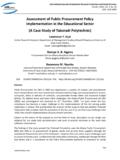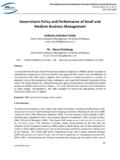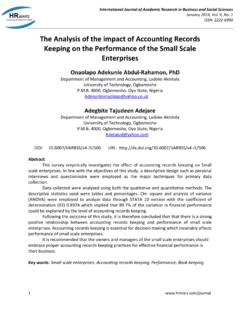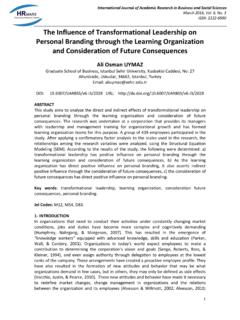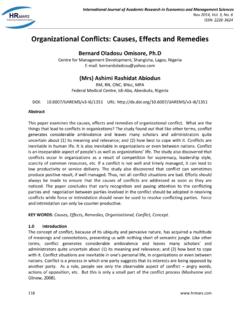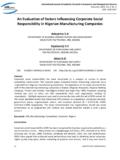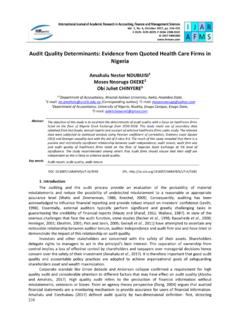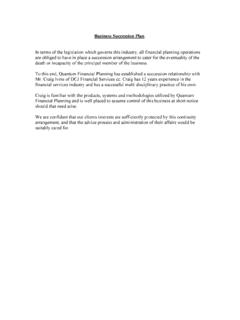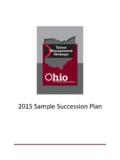Transcription of Factors affecting Succession Planning in Small and Medium ...
1 International Journal of Academic Research in Business and Social Sciences August 2013, Vol. 3, No. 8 ISSN: 2222-6990 285 Factors affecting Succession Planning in Small and Medium Enterprises in Kenya Florence Mutunga Box 26 60100, EMBU, KENYA Email: Dr. Hazel Gachunga Jomo Kenyatta University of Agriculture and Technology, School of Human Resource Development, Box 62000 00200, NAIROBI, KENYA DOI: URL: Abstract The main purpose of the study was to investigate the Factors affecting Small and Medium Enterprises in Kenya.
2 Specific objects of the study included establishing how nurturing and development is a factor influencing Succession Planning in Small and Medium Enterprises The study will be significant to the Small and Medium -scale Enterprises, and the government who will appreciate and understand the Factors affecting Succession Planning of Small and Medium Enterprises. This will enable policy makers, practitioners and other SMEs stakeholders to identify the Factors that affect the growth of the SMEs with a view to understand and appreciate the importance of their services to financing of Small and Medium Enterprises and be able to encourage use of Succession plans.
3 It will also provide background information to researchers who may want to carry out further research. The study established that Small and Medium enterprises have a Succession plan, replace the current owner/manager with a successor in good time, plan ahead for Succession and customers do find it easy to get used to the new owner. The study recommends a need for the government and SMEs to create an appropriate information base to support and promote SMEs in Succession Planning and come up with a follow up policy and mechanism.
4 Keywords: Human Resource Management, Succession Planning , Small and Medium Enterprises. Introduction Small and Medium enterprises vary in definition. The Wiltshire Committee s definition of Small business is often used by researchers and states that: ..it is a business in which one or two persons are required to make all the critical management decisions such as finance, accounting, personnel, purchasing, processing or servicing, marketing, selling, without the aid of internal specialists and with specific knowledge in only one or two functional (Berryman, 1983).
5 International Journal of Academic Research in Business and Social Sciences August 2013, Vol. 3, No. 8 ISSN: 2222-6990 286 The term SME covers a wide range of definitions and measures, varying from country to country and between the sources reporting SME statistics. In developing countries the number of employees and the size of assets or turnover for SME tend to be much smaller compared to their counterparts in developed countries due to their relative size of business entities and economies (Nation Media and KPMG, 2011).
6 In Kenya, types of Small Scale Businesses include; survivalist enterprises which are activities by people unable to find a paid job or get into an economic sector of their choice. Micro enterprises are very Small business, often involving only the owner, some family member(s) and at the most one or two paid employees. Medium enterprises constitute a category difficult to demarcate vis-a`-vis the Small and big business categories. Kenya has about million registered Small and Medium enterprises constituting about 96% of all business enterprises in the country (KPMG and Nation Media Group, 2004).
7 A recent survey dubbed, the annual top Small and Medium enterprises in East Africa that is carried out by audit firm KPMG and Nation Media Group found out that revenue growth was highest in the past 12 months for Small businesses in construction at 61%, services 46% and information technology 44% - segments of the economy reflecting the intensity of activity in the sectors. Majority of these Small and Medium enterprises are family owned business units with the family member being the majority shareholders.
8 They are also known for their poor book keeping records and the secrecy in which they conduct their businesses. (KPMG and Nation Media Group, 2004). Small and Medium Enterprises are generally distinguished by the nature of their production and management arrangements, trading relations, financial practices, and internal competence among others. The major characteristics of Small and Medium enterprises are:- Small units, often rural-based and family-owned; Small independent enterprises, standing alone and producing for a well-defined market; specialized firm, producing specialized products, selling to the international and or local markets; rely on low cost raw materials, low energy costs, low labor costs, low division of labor; flexible and often Small production runs.
9 Low capital formation and largely labor intensive units with low-level technologies; but note the emergence of high skill and technology-intensive Small and Medium enterprises, especially in high technology industries (World Bank, 2007). The development of Small and Medium Enterprises has been hindered by political instability or strong dependence on a few raw materials as opposed to a fairly modern financial systems and clear government policies in favor of private enterprise. Small and Medium Enterprises are weak in Africa because of Small local markets, undeveloped regional integration and very difficult business conditions, which include cumbersome official procedures, poor infrastructure, dubious legal systems, inadequate financial system and unattractive tax regimes (World Bank, 2007).
10 Many firms stay Small and informal and use simple technology that does not require great use of national infrastructure. Their smallness also protects them from legal proceedings so they can be more flexible in uncertain business conditions (MSME Brochure, 2007). International Journal of Academic Research in Business and Social Sciences August 2013, Vol. 3, No. 8 ISSN: 2222-6990 287 A family-owned enterprise is a total system that is derived from a number of sub-systems, including the founding entrepreneur as an entity, the family member as an entity and the enterprise as an entity (Dyer and Handler, 1994).
